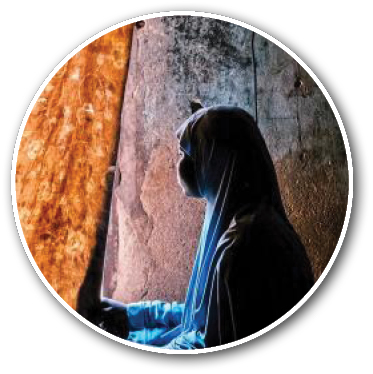“My aunty will beat me if I go home. I must sell everything before going home. Two are left and I can’t go home. She will beat me if I go home with them,” Cheto Yohanna said. She was eight years old when she was rescued by officials of the National Agency for the Prohibition of Trafficking in Persons (NAPTIP).
Yohanna, an orphan was taken from Kaduna to Abuja by her guardian on the promise of enrolling her in school. Two years after leaving her relatives, she has not been enrolled in school but made to hawk vegetables.
She was reported to have been afraid to return home and slept in front of a house within her neighbourhood.
“She folded her hands inside her rag-like black blouse to reduce the overbearing cold. Her skirt betrayed her as it was too skimpy to hide he dust-laden legs. An observer needed not be told that those legs had trekked a far, dusty distance, which is what she did all day under a tray of ‘ugwu’ a vegetable,” Daily Trust’s Francis Iloani reported.
Yohanna was among several girls and children taken from their parents with promise of better life but subjected to abuse.
“Such children are taken from their parents for a reason but used for another purpose entirely different from what their parents were made to believe. To me, they were abducted because their free will and consent were denied them,” Mrs Abidemi Adeleye, a Lokogoma resident said.
“I have heard several reports where I stay of young girls that have to stand on a stool to be able to wash cars in the cold morning. Some were tortured and had to run away. Others hawk and never go to school, several stories all very inhuman have been their lot,” she said.
According to the UNICEF, trafficking of children for the purpose of domestic service, prostitution and other forms of exploitative labour are widespread in Nigeria.
“Children and women are recruited with promises of well-paid jobs in urban centres within the country or overseas, only to realise later that they have been hoodwinked into a debt bondage. Violence, coercion and deception are used to take victims away from their families,” UNICEF says on its website.
Regrettably, the international agency said there was yet no reliable estimate of the number of children trafficked internally and externally primarily because of the clandestine nature of the phenomenon.
However, NAPTIP in 2018 said it received 1,076 human trafficking and other related cases. The agency said 1,173 victims were rescued out of which 983 were females with 581 between zero and 17 years old.
ReliefWeb in its report in October 2019, quoted Kingsley Chidiebere to have described human trafficking as when someone is taken from Nigeria to another country to be a prostitute, or for other illegal jobs.
“Though a father himself, Chidiebere, like others interviewed, did not know that children were trafficked to other countries and within Nigeria as well,” ReliefWeb said.
According to NAPTIP, the two most-reported human trafficking cases were of women who are prostituted internationally and the employment of children as domestic workers. “In many cases these child labourers also suffer physical abuse.”
The Presidents of One Ummah Organisation and board member of Halal Children’s Home, Malam Abubakar Sadiq Muhammad said fostering a child was not what some people do by bringing children from the villages because the parents were poor. He said some people later turn the children into maids.
“That is not fostering; what you do is you build resentment in the mind of the child; you don’t build them to be confident and have that feeling that they can be something in life,” he said, adding that people needed to show love to the children that are orphaned for no fault of theirs.

 Join Daily Trust WhatsApp Community For Quick Access To News and Happenings Around You.
Join Daily Trust WhatsApp Community For Quick Access To News and Happenings Around You.


